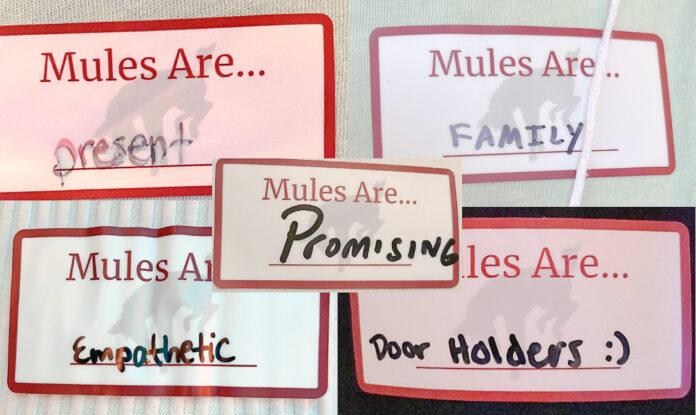Orientation Weekend is an established tradition at Muhlenberg, with four days filled with information, games and events, all in effort to help incoming students build community and connection as they embark on their college journey.
The third day of Orientation Weekend 2023, Aug. 26, was titled “Mules Are…” Day. This day consisted of events surrounding mental health education, information of Muhlenberg’s updated Diversity, Equity, Inclusion and Belonging (DEIB) policies and conversations on how to be an empathetic community member. The theme of the day was to teach incoming students that Mules are a versatile and supportive community, equipped with resources available to help students thrive.
The day kicked off with an interactive presentation for students. As all the students sat in Empie Theatre, questions were projected on a screen, and everyone was instructed to lift up their phone flashlights for the questions that resonated with them. The questions ranged from asking who in the crowd was feeling nervous or excited, to where people are from, to who is planning on studying science or art. As the theatre lit up with each question, the goal of the presentation was clear in its effort to set the tone for the day: Muhlenberg is a community, and you are not alone here.
This presentation was followed by conversations, discussions and events designed to teach the incoming students about the resources Muhlenberg offers for students. Tim Black, the director of student transitions and family programs, spoke on what this day meant to him, stating “Each day of orientation has a theme or focus. Thursday is all about ‘welcome home.’ Friday is about academic success. Saturday is about what it means to be a Mule and a member of this community. While there was a focus on mental health and DEIB, that wasn’t the only focus of the day. If I had to boil it down to one word, it would be connection. Connection to each other, connection to resources and connections to campus. We wanted students to walk away knowing what is expected of them as a member of this community and where to turn if they need support. With the exciting launch of our DEIB statement in Jan. 2023, we knew we wanted all Mules to know what our commitment and expectations around DEIB are.”
“I was really proud of how the day turned out. We, as a college, expressed our expectations and the students not only listened but were engaged. Particularly in the ‘Mules are…Inclusive’ sessions, the conversation filled me with so much hope and inspiration. I wanted students to walk away with an understanding of not only what is expected of them, but how to be an active, engaged participant in this community,” he continued.
“if you see something that is not working, or if you want to do something in a different manner, you can go ahead and propose and implement new ways of being together”
Leticia Robles-Moreno
“Mules are…” Day was known as something different in past Orientation Weekends. Instead of the presentations and discussions constructed for this day during Orientation Weekend 2023, in previous years, this day of Orientation presented the Sedehi Diversity Project (SDP). Leticia Robles-Moreno, Ph.D., an assistant professor of theatre and performance studies, who worked to create and execute SDP, provided more insight on the project and why the decision was made to not continue it for the past two years.
Robles-Moreno said, “It was a combination of how everything changed in the midst of COVID-19, exhaustion and burnout of student leaders and the realization that new generations of college students find different ways to approach DEIB issues. Last year, a group of SDP students – old and new – worked on the SDP Open Dialogues, a space for peer-to-peer conversations about what still needs to be done to keep making Muhlenberg a more welcoming community for everyone — this is a new format can be led by new students at any time.”
“SDP transformed my life at Muhlenberg, helping me to better listen and understand what my students have to say. This was an initiative that came from students who wanted to [have] open, honest and brave conversations during Orientation Week, and it was always by students for students. This is a model that all first-year students, and everyone, are welcome to think about: If you see something that is not working, or if you want to do something in a different manner, you can go ahead and propose and implement new ways of being together,” Robles-Moreno continued.
The work SDP was created to do, is still work that is actively done in the Muhlenberg community, as Robles-Moreno stated. SDP had a desire to teach and inform incoming students on not only DEIB policies of the College, but to provide students with a space for open conversation surrounding community, inclusion and connection. When asked about how “Mules are…” Day was created and how it would continue the goals of SDP, Black answered, “Sedehi Diversity Project made the decision to take time off last year during Orientation 2022. The decision was made by the students and faculty leading the project not to return this year as well. This year we decided to utilize the talent of our faculty and staff at Muhlenberg to try something new. Once we knew SDP was not returning, we brought together key players from the Provost Office, Office of Multicultural Life, Dean of Students Office and Housing and Residence Life to begin formulating the day.”
Black went further to explain the importance of “Mules are…” Day and it’s goal by stating, “Post-COVID, we felt the need to reset community expectations and make sure that incoming students know how they should treat one another and that students acting in bias, discriminatory or other disrespectful ways is outside the social norms of our campus community. Framing this as ‘at Muhlenberg we treat others with respect, help one another and ask for support in troubling or harmful situations’ allows them to see that they are part of the community by doing those things and that if they choose not to do those things, they will be operating outside of our community expectations. There is a lot of important psychological research on the benefits of social norms versus approaching things from a more punitive perspective alone.”
Orientation leaders were meant to facilitate conversations and discussions among their groups of students, gauging their reactions and feelings surrounding the information they were given during this day. Orientation Leader Maya Brooks ‘24 expressed, “It’s hard to motivate a group of freshmen to be excited about a day of presentations but I didn’t receive much pushback from my students which I was grateful for. I liked the ‘Mules are…’ Day. I thought it was a necessary revamp of the program that was more catered to a realistic freshmen experience in a more digestible way.”
” I wanted students to walk away with an understanding of not only what is expected of them, but how to be an active, engaged participant in this community”
Tim Black
Rachel Anderson ‘25, a transfer student who was an Orientation leader for incoming transfer students, provided insight on her view of “Mules are…” Day and how her students reacted to it saying, “They were really receptive. During and after the different sessions, my students were engaged in conversations about what they took away from the talks and how they could continue to apply the lessons during their time at Muhlenberg. Specifically after the DEIB session and during our restorative circle, they each reflected on the DEIB work Muhlenberg is doing, and how it differed from the other institutions they attended. They remarked that DEIB work like this is the reason they picked Muhlenberg, and how they appreciated Muhlenberg holding itself accountable to actually do the work it claims to value. I’ve never seen a group of students so engaged, especially during such a long day of people talking to them! They seemed to understand the responsibility of being a part of the Muhlenberg community, and were eager to begin joining organizations and commit to the work!”
Anderson went on to say, “It’s always the hope that students who come here appreciate and see the value in the day, as I think it’s really important. So many institutions make claims about the DEIB work they do behind the scenes or the prevention education they do, but few institutions really take the time to tell incoming students what exactly that work is, and to ask students to hold them accountable if they aren’t doing the work. So, seeing my students appreciate that and really reflect on it was inspiring.”
Shinam ‘25 is a political science and sociology major at Muhlenberg. She is immensely excited to be apart of the Weekly staff! When she isn’t writing, she can be found reading a book or watching a comfort show with her favorite fast food!























